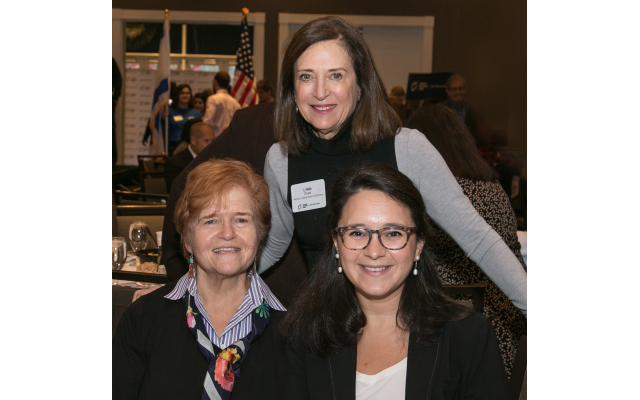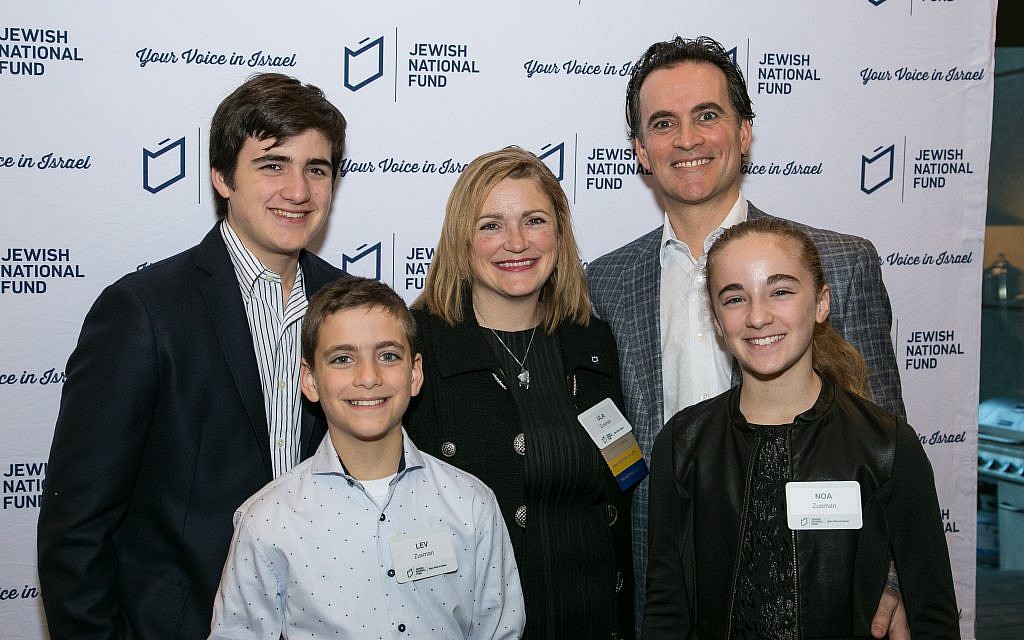JNF Breakfast Speaker Serves Up ‘Seven Dirty Words’
Bari Weiss, New York Times op-ed writer and editor, spoke at the Jewish National Fund’s annual Jack Hirsch Memorial Breakfast on Nov. 27.
Dave Schechter is a veteran journalist whose career includes writing and producing reports from Israel and elsewhere in the Middle East.

Bari Weiss remembers Shabbat dinners from her childhood, a “sacred time,” when her family would sing “Shalom Aleichem” and pass around a blue-and-white box bearing the words Keren Kayemet LeYisrael.
“My parents were very clear on where the money was going. Our tzedekah was going to plant trees in the land of Israel, a place I had heard a lot about but had yet to visit,” the New York Times op-ed writer and editor told the Jewish National Fund’s annual Jack Hirsch Memorial Breakfast on Nov. 27.
And when the family spent a summer in Israel, 8-year-old Bari and her younger sister were ecstatic (thanks to some parental cleverness) to find two small trees, bearing signs with their names written in calligraphy, in a park near their Jerusalem apartment.
“The craziest part of the story is that it wasn’t until I was like 20 years old that I realized that it wasn’t true,” Weiss joked, to laughter from an audience of 350 people.
The breakfast honored the Horwitz and Zusman families for their contributions to JNF and Israel. David and Merle Horwitz were unable to attend, but the family was represented by their daughter, Ula Horwitz Zusman, her husband, Michael Zusman, and their children, Lev, Noa and Ziv.

A native of Pittsburgh’s Squirrel Hill neighborhood, Weiss did not discuss the Oct. 27 massacre of 11 worshippers at the Tree of Life*Or L’Simcha Congregation.
She focused, instead, on values, “the ones I believe we’re losing sight of and the ones I believe we need to recover if we want to build a Jewish future that can face the challenges of the 21st century.”
Referencing a book she is writing “about the virtues that have fallen out of fashion or favor in our culture,” Weiss offered her list of “seven dirty words in the Jewish world, … words that signify values that are not being inculcated in young people, topics that we assiduously avoid, and debates that we are too cowardly to have.”
Topping Weiss’ list was “peoplehood,” the need for Jews to appreciate the rich legacy of their history, to think of themselves as one people, and focus on the Jewish future in the 21st century, rather than becoming mired in internal debates. “We need to bring Jewish peoplehood in a serious way,” she said.
Next came “empathy,” particularly between American and Israeli Jews. The former must recognize that the latter live “in a region that could not be more different than our own,” Weiss said, requiring daily decisions about security. “It is violent and requires an embrace of power and force that most American Jews who have never shot a gun would be deeply uncomfortable with,” she said.
“The lack of empathy can go in the other direction. It’s painfully obvious when Israeli leaders talk about American Jewish life as if it’s some pale ghost, some husk of a thing, when the values that we are so proud of, our pluralism, our inclusiveness, our tolerance, are denigrated as weakness,” she said.
Adding “loneliness” to her list, Weiss praised Abraham, who “stood radically against the prevailing orthodoxy of his time,” and cited two lessons from his story: a “refusal to worship false idols and, two, the courage to be out of step with those around you.”
Weiss might have been describing the reaction to her writings, pleasing neither end of the political spectrum. (“She eschews political labels. She refuses to be categorized,” Emory University Professor Deborah Lipstadt said in introducing Weiss).
“Jews in American politics today are a lot like Abraham. We are homeless and nomadic. The Jews are left out of the left, which tells us that we need to check our Zionism, our particularism, at the door of progressive spaces. And on the right, we are told that our commitment to universal ideals, to welcoming the stranger and the refugee makes us squishes,” Weiss said.
“We need to be courageous enough to stand apart, to not bend toward the crowd, and not give in to groupthink. We should find strength and pride in this loneliness, in the reality of being an idol-smashing people,” she said.
Fourth was the concept of “chosenness,” a subject that makes many Jews uncomfortable. Nonetheless, “Chosenness is absolutely fundamental to Judaism. It is foundational,” Weiss said.
“It’s time to confront chosenness,” she said, to help answer such questions as what it means to be Jewish and whether chosenness can be based on something other than a belief in God.
“The east, mizrach” was fifth. American Jews who view Israel through an Ashkenazic, European immigrant lens, miss that Israel is also, as Weiss put it, the Jews of Tunis, Algiers, Mosul and Cairo. Jews whose heritage is in the Middle East and North Africa make up more than half the population of Israeli Jews. “Their stories are essential, not just for understanding Israel, but for making the case that it is indigenous to the region.
“Israel, we must insist, is not an alien outpost in a strange land,” as some critics suggest, but rather “a historic tikkun, a fixing, a return,” Weiss said.
“The occupation” may have been the dirtiest word on Weiss’ list, but she insisted that American Jews “look in the mirror and confront the subjects that we have learned to avert our eyes from,” including Israel’s policies toward Palestinian Arabs.
“This is challenging but it is absolutely crucial. … Keeping young Jews ignorant about the reality on the ground in the state of Israel is a recipe for disaster. There is another people that lives in the land of Israel. You might think that Israel’s occupation is justified, or you might think it is an existential threat, but the reality is there. And it is, at best, a tragedy. And to tell the story of modern Israel, leaving out their story, their claim, is to do a huge disservice to young Jews, the vast majority of whom naturally are on the political left,” she said.
“Jewish schools, especially, have an obligation to figure out how to teach this, because Jewish high school students should not be entering college defenseless. The bottom line is that we want to be raising and educating young Jews who are hard-headed about the challenges that Israel faces, but also open-hearted, who recognize the paradox in which Israel may be a David in the region, but a Goliath in the lives of the Palestinians,” Weiss said.
Last on her list was “power,” which, historically, Jews did not possess. Today, though, Jews “have political and military power, especially in Israel, and here in the U.S. we have unimaginable social, financial and other power.”
The question is how to use that influence, for which Weiss offered herself as an example.
“I get to go to work every day at the greatest newspaper in the world. … I get paid to debate the most pressing matters and ideas of the day and express my own. And I never, ever, check my Jewish or Zionist identity at the door of The New York Times or any other door of any room that I enter. My ancestors could not have dreamed of this reality. Part of the reason for it is that the existence of the state of Israel makes my life possible. It gives me confidence to walk through the world, and that has to do with Jewish power, and I think that’s something we need to talk more about.”



comments